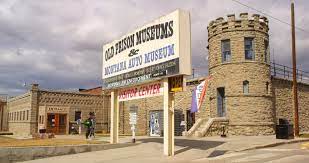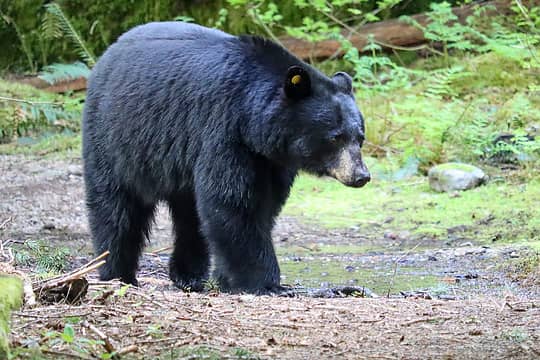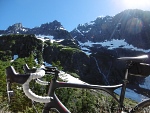| Previous :: Next Topic |
| Author |
Message |
Schroder
Member


Joined: 26 Oct 2007
Posts: 6721 | TRs | Pics
Location: on the beach |
 |
Schroder
Member
|
 Mon Mar 27, 2023 4:50 pm |
|
|
Plans to bring grizzly bears back to North Cascades move forward
By LUKE THOMPSON
Yakima Herald-Republic, Wash.
The latest efforts to restore grizzly bears in the North Cascades appear to be on track to take another big step forward in June.
U.S. Fish and Wildlife spokesperson Andrew LaValle recently confirmed that the agency expects to put out a draft environmental impact statement, or EIS, in June for plans to bring the bears to Washington state. The process nearly reached a final EIS before the Trump administration shut it down with no explanation in July 2020.
North Cascades National Park wildlife supervisor Jason Ransom said the new EIS should allow for more flexibility for federal officials as they try to slowly build back a population believed to be on the verge of extinction. He’s hopeful that will sway opponents concerned about threats to livestock and humans recreating in the North Cascades ecosystem comprised of more than 2.6 million acres of federally designated wilderness.
“We did reach out to all the congressional representatives in Washington,” Ransom said. “We’ve briefed all of them once. Right now everybody’s just waiting on the draft EIS that has the real specific plans.”
He said those will include details such as additional management options, maps identifying where officials want bears to go and strategies for how to handle animals if they go outside those boundaries. An experimental population rule-making process would allow the National Park Service and the USFWS to better manage and regulate bears as they are brought in from British Columbia and northwest Montana.
The proposal would introduce three to seven bears over five to 10 years with the objective of reaching a population of 25. Once that goal is achieved, more bears could be released as the agencies seek to create a population of 200 grizzlies within 60-100 years.
A final EIS could be made available to the public in spring 2024, followed closely by a record of decision allowing land managers to move forward with translocations. However, the suspension of the process in 2017 shortly after a draft EIS came out and then the termination in 2020 after 2018’s surprising message of support from Secretary of the Interior Ryan Zinke showed how quickly plans can change.
Ransom said the agencies received around 6,200 pieces of correspondence in response to November’s notice of intent, and those will be considered along with the more than 126,000 pieces of correspondence submitted in 2017, many of which the USFWS said contained multiple substantive comments. LaValle expects to see a combination of in-person and virtual meetings later this year to discuss the plans with supporters as well as a vocal group of opponents, which includes U.S. Rep. Dan Newhouse, R-Sunnyside.
“My constituents and I have consistently opposed proposals to [introduce grizzly bears into the North Cascades] under multiple administrations because introducing an apex predator to the area would threaten the families, wildlife and livestock of North Central Washington,” Newhouse said in a statement in November. “I strongly encourage the people of Central Washington to attend the virtual meetings in order to voice their opinion and put this misguided proposal to rest, once and for all.”
Conservation Northwest International Programs Director Joe Scott pointed out the majority of respondents favored grizzly bear restoration. He believes the federal agencies could finally succeed at accomplishing what has been a goal since 1987, with formal efforts dating back to 1997, and said the land managers have the most to lose if conflicts with bears go poorly.
“Restoring bears from near zero is quite a difficult task and I don’t think people really understand how difficult it is,” Scott said. “The animals suitable for translocations to a place like the Cascades, it’s a small set of animals out there.”
LaValle said officials have already talked to the Colville Tribe and plan to continue discussions with several others, along with local landowners and cooperating agencies such as the U.S. Forest Service and the Washington Department of Fish and Wildlife. Although Washington law prevents state officials from participating directly in translocating grizzlies, WDFW’s diversity division manager, Hannah Anderson, said the agency is required to be involved in conversations and plans to offer technical support and expertise when possible.
Some 50 to 70 grizzlies already live in Northeast Washington’s Selkirk Mountains, one of six grizzly bear recovery zones throughout the U.S. that represent an estimated 3% of the bear’s former range. Scott acknowledged some conflicts may be unavoidable but said he’s looking forward to helping combat what he referred to as disinformation and a lack of knowledge to help people understand the importance of bringing grizzly bears back to the ecosystem.
“The thing about the Cascades is that it’s the only potential landing spot for recovery or restoration outside the Rocky Mountains,” Scott said. “If we cannot accommodate them in this minuscule percentage of their former range, what does that say about us as a species?”
 silence, RumiDude silence, RumiDude  Slim, zimmertr Slim, zimmertr
 silence, RumiDude silence, RumiDude  Slim, zimmertr Slim, zimmertr |
| Back to top |
  
|
 |
Worthington
Member


Joined: 23 Jun 2021
Posts: 80 | TRs | Pics
|
| Schroder wrote: | | Plans to bring grizzly bears back to North Cascades move forward
Some 50 to 70 grizzlies already live in Northeast Washington’s Selkirk Mountains, one of six grizzly bear recovery zones throughout the U.S. that represent an estimated 3% of the bear’s former range. Scott acknowledged some conflicts may be unavoidable but said he’s looking forward to helping combat what he referred to as disinformation and a lack of knowledge to help people understand the importance of bringing grizzly bears back to the ecosystem. |
Conservation NW, who are very generous in their estimates of Grizzly, suggest: "roughly a dozen likely reside in Washington." regarding the Grizz in the very NE corner of WA in the Selkirk Mountains.
|
| Back to top |
  
|
 |
Anne Elk
BrontosaurusTheorist


Joined: 07 Sep 2018
Posts: 2419 | TRs | Pics
Location: Seattle |
 |
Anne Elk
BrontosaurusTheorist
|
 Tue Mar 28, 2023 11:27 am |
|
|
“The thing about the Cascades is that it’s the only potential landing spot for recovery or restoration outside the Rocky Mountains,” Scott said. “If we cannot accommodate them in this minuscule percentage of their former range, what does that say about us as a species?”
What ridiculous rhetoric. There's been plenty "said" about us as a species; we've been extirpating other life forms, races, ecosystems, you name it, for centuries. It's one of our top skills. Conservation NW et al wants what it wants and has no sense of perspective whatever on reality or what can practically be achieved. Scott admits that the NC is a "miniscule % of their former range", but thinks they should do it, anyway. All the odds work against it: not enough room, climate change making the bears' usual habitat even less habitable, and then the inevitability of incursions into farms and human habitation for food. I doubt the area could reasonably sustain so many bears. There will be the inevitable calls for killings when the conflicts occur. A huge waste of financial and human resources.
Maybe I'm just too pragmatic. It's over, people. We're past the tipping point in so many ways. People need to stop rearranging chairs on the Titanic. I'm also having a bad day, so zero patience for this. 
"There are yahoos out there. It’s why we can’t have nice things." - Tom Mahood
"There are yahoos out there. It’s why we can’t have nice things." - Tom Mahood
|
| Back to top |
  
|
 |
reststep
Member


Joined: 17 Dec 2001
Posts: 4757 | TRs | Pics
|
 |
reststep
Member
|
 Tue Mar 28, 2023 11:45 am |
|
|
From the article:
“Conservation Northwest International Programs Director Joe Scott pointed out the majority of respondents favored grizzly bear restoration. He believes the federal agencies could finally succeed at accomplishing what has been a goal since 1987, with formal efforts dating back to 1997, and said the land managers have the most to lose if conflicts with bears go poorly.”
I would be interested to know how the land managers would have the most to lose if conflicts with bears go poorly. It seems like ranchers and farmers might have the most to lose and maybe hikers also.
"The mountains are calling and I must go." - John Muir
 runup runup
"The mountains are calling and I must go." - John Muir
 runup runup
|
| Back to top |
  
|
 |
Sculpin
Member


Joined: 23 Apr 2015
Posts: 1384 | TRs | Pics
|
 |
Sculpin
Member
|
 Tue Mar 28, 2023 11:57 am |
|
|
| Anne Elk wrote: | | no sense of perspective whatever on reality or what can practically be achieved |
What he provided in the article was literally a "perspective," followed by some brief statements about what can be achieved that seem plenty practical to me.
| Anne Elk wrote: | | not enough room |
It's 2.6 million acres, for crissakes, it's plenty of room for a fully functioning population. There is, just as an example, a fully functioning population within Glacier National Park that coexists with humans.
| Anne Elk wrote: | | climate change making the bears' usual habitat even less habitable |
I'm down in the Napa Valley for the winter. If you go back 150 years, grizzlies were crazy thick here. One of the original settlers George Yount reported seeing 30 on his property at once during acorn season, when territoriality diminishes every year. It's hotter than Hades down here in the summer. Climate change will not make the Cascades unsuitable for grizzlies until the continental glaciers cover everything over once again.
Missing from the equation is any sense of intrinsic value in anything not human. 
Between every two pines is a doorway to the new world. - John Muir
 dave allyn, Cyclopath dave allyn, Cyclopath
Between every two pines is a doorway to the new world. - John Muir
 dave allyn, Cyclopath dave allyn, Cyclopath
|
| Back to top |
  
|
 |
runup
Member


Joined: 05 Feb 2016
Posts: 188 | TRs | Pics
|
 |
runup
Member
|
 Tue Mar 28, 2023 2:30 pm |
|
|
| Anne Elk wrote: | | Tue Mar 28, 2023 11:27 am Anne Elk wrote:
“The thing about the Cascades is that it’s the only potential landing spot for recovery or restoration outside the Rocky Mountains,” Scott said. “If we cannot accommodate them in this minuscule percentage of their former range, what does that say about us as a species?”
What ridiculous rhetoric. There's been plenty "said" about us as a species; we've been extirpating other life forms, races, ecosystems, you name it, for centuries. It's one of our top skills. Conservation NW et al wants what it wants and has no sense of perspective whatever on reality or what can practically be achieved. Scott admits that the NC is a "miniscule % of their former range", but thinks they should do it, anyway. All the odds work against it: not enough room, climate change making the bears' usual habitat even less habitable, and then the inevitability of incursions into farms and human habitation for food. I doubt the area could reasonably sustain so many bears. There will be the inevitable calls for killings when the conflicts occur. A huge waste of financial and human resources. |
-------------------------
   
|
| Back to top |
  
|
 |
Anne Elk
BrontosaurusTheorist


Joined: 07 Sep 2018
Posts: 2419 | TRs | Pics
Location: Seattle |
 |
Anne Elk
BrontosaurusTheorist
|
 Tue Mar 28, 2023 3:14 pm |
|
|
| reststep wrote: | | From the article:
“Conservation Northwest International Programs Director Joe Scott pointed out the majority of respondents favored grizzly bear restoration. |
This comment reminded me of what happens frequently at Seattle City Council meetings when public hearings are held. The room is often packed with the loudest proponents, but they're far from the true majority.
| Sculpin wrote: | It's 2.6 million acres, for crissakes, it's plenty of room for a fully functioning population. There is, just as an example, a fully functioning population within Glacier National Park that coexists with humans.
| Anne Elk wrote: | | climate change making the bears' usual habitat even less habitable |
I'm down in the Napa Valley for the winter. If you go back 150 years, grizzlies were crazy thick here. One of the original settlers George Yount reported seeing 30 on his property at once during acorn season, when territoriality diminishes every year. It's hotter than Hades down here in the summer. Climate change will not make the Cascades unsuitable for grizzlies until the continental glaciers cover everything over once again.
...Missing from the equation is any sense of intrinsic value in anything not human. |
I'm not sure it's reasonable to compare the huge buffer zones of empty space around Glacier NP with the megalopolis of Puget Sound. The central Puget Sound region grew by 600,000 in the last 10 years. The population now stands at 4.3 million, up from 3.7 million in 2010 (stats from Puget Sound Regional Council). The whole population of Montana was 1.1 million in 2021.
As far as griz being crazy thick in CA 150 years ago, it's all about plant biome. That's changing. I'm not a biologist, but we humble gardeners see details in the forest growth that few people are aware of yet. The native trees and shrubs are crisping more every year. Even the sword ferns are struggling, and I saw an article not long ago about pika having a harder time and having to migrate to higher altitudes. In other threads I've commented multiple times about how western WA is becoming increasingly dessicated, citing the historical Palmer Drought Indices. It's not even about how much snowpack accumulates these winters, it's how fast it melts. We're having longer periods of dryness and soils are drying way beyond what our vegetation normally tolerates during our normal dry months.
Also, you misunderstand me. It's not that I don't value them. I just feel it's too late. It's like what it would take to truly make a dent in global warming. Remember how few cars were on the road during the early months of the pandemic? We'd have to roll back vehicle emissions even more than that, probably years ago, to try to reverse things. Not gonna happen in time. What griz restoration is going to mean is a bunch will eventually have to be hunted down when the conflicts occur. I'm not in favor of that. The wolf pack killings are bad enough.
"There are yahoos out there. It’s why we can’t have nice things." - Tom Mahood
"There are yahoos out there. It’s why we can’t have nice things." - Tom Mahood
|
| Back to top |
  
|
 |
cdestroyer
Member


Joined: 14 Sep 2015
Posts: 1250 | TRs | Pics
Location: montana |
|
| Back to top |
  
|
 |
Celticclimber
Member


Joined: 04 Aug 2012
Posts: 329 | TRs | Pics
Location: Index |
I really hate to say that I agree with Anne Elk: that it's already too late...to save anything ( including us  )
However. This griz reintro debate has been going on since the 90's. So how long are we going
to keep pushing this along?
All that being said: I still think we should give it a go.
Ma Nature can figure out if it will work or not. )
However. This griz reintro debate has been going on since the 90's. So how long are we going
to keep pushing this along?
All that being said: I still think we should give it a go.
Ma Nature can figure out if it will work or not.
Live every day like you will die to-marrow.
For some day that will be true.
Live every day like you will die to-marrow.
For some day that will be true.
|
| Back to top |
  
|
 |
The Ghost of Bear 380
~SJ~


Joined: 15 Dec 2022
Posts: 19 | TRs | Pics
Location: In your IG feed |
I'm in the pro-bears camp, and mostly for the tribes of the PNW. Indigenous Peoples' spiritual and cultural connection to the grizzly bear is well documented. Indigenous Peoples have been the best stewards of the lands we recreate on. Like, for millennia. Nobody has managed their lands better than they have. They want the bears back and I think we should trust and honor that. This is one part of the convo that doesn't get talked about enough (or at all).
When it comes to wildfires and how the west is burning up every year, there is more and more talk about how we should manage the forests as they did. Meaning, low intensity burning early in the dry season. I've seen that debate on this site. Funny that some people trust the tribes' judgement for fire management, but not for wildlife management.
| Worthington wrote: | | Schroder wrote: | | Plans to bring grizzly bears back to North Cascades move forward
Some 50 to 70 grizzlies already live in Northeast Washington’s Selkirk Mountains, one of six grizzly bear recovery zones throughout the U.S. that represent an estimated 3% of the bear’s former range. Scott acknowledged some conflicts may be unavoidable but said he’s looking forward to helping combat what he referred to as disinformation and a lack of knowledge to help people understand the importance of bringing grizzly bears back to the ecosystem. |
Conservation NW, who are very generous in their estimates of Grizzly, suggest: "roughly a dozen likely reside in Washington." regarding the Grizz in the very NE corner of WA in the Selkirk Mountains. |
Yeah, I saw that 50 to 70 number and was like WHAAAT?!? Seemed crazy high. I texted my girl in Spokane who hikes a lot in the Selkirks, and she said the 50-70 figure is for the whole Selkirk ecosystem. So WA, ID, and BC. That makes more sense.
|
| Back to top |
  
|
 |
Chief Joseph
Member


Joined: 10 Nov 2007
Posts: 7703 | TRs | Pics
Location: Verlot-Priest Lake |
| Sculpin wrote: | | There is, just as an example, a fully functioning population within Glacier National Park that coexists with humans. |
Yea the bears there love co-existing with humans, gives them a nice fat meal every now and then. "Only" 10 people killed by bears there since 1967 so pretty safe, but you won't catch me backpacking there. 
Go placidly amid the noise and waste, and remember what comfort there may be in owning a piece thereof.
 Joseph Joseph
Go placidly amid the noise and waste, and remember what comfort there may be in owning a piece thereof.
 Joseph Joseph
|
| Back to top |
  
|
 |
altasnob
Member


Joined: 29 Aug 2007
Posts: 1406 | TRs | Pics
Location: Tacoma |
 |
altasnob
Member
|
 Thu Sep 28, 2023 9:22 pm |
|
|
Draft Grizzly Bear Restoration Plan / Environmental Impact Statement, North Cascades Ecosystem
The National Park Service and U.S. Fish & Wildlife Service are seeking public input on a draft Environmental Impact Statement (EIS) that evaluates options for restoring grizzly bears to the North Cascades Ecosystem in Washington, where the animals once roamed.
Comment Period: Sep 28, 2023 - Nov 13, 2023
https://parkplanning.nps.gov/document.cfm?parkID=327&projectID=112008&documentID=132104
 RumiDude RumiDude
 RumiDude RumiDude |
| Back to top |
  
|
 |
Cyclopath
Faster than light


Joined: 20 Mar 2012
Posts: 7732 | TRs | Pics
Location: Seattle |
 |
Cyclopath
Faster than light
|
 Thu Sep 28, 2023 9:54 pm |
|
|
| Anne Elk wrote: | Maybe I'm just too pragmatic. It's over, people. We're past the tipping point in so many ways. People need to stop rearranging chairs on the Titanic. I'm also having a bad day, so zero patience for this.  |
Ten years ago, I would have said you're wrong. 
|
| Back to top |
  
|
 |
Bowregard
Member


Joined: 05 Feb 2019
Posts: 562 | TRs | Pics
Location: Sammamish |
I am not opposed to grizzlies in the Cascades and I was around when there used to be a reasonable population here. And I am by no means an expert on the species or the Cascade ecosystems. But does anybody really believe that the ecosystem will support a self-sustaining population of Grizzly bears well into the future?
GNP has a sizable population of bears with a limited number of roads and if you sign up for the information notices you will get a very clear idea of how much time, effort, and resources are spent trying to manage the co-existence of bears and humans. The Cascades today are not the same as they were when the Grizzly thrived here and IMHO are different than GNP and other areas that support Grizzly bear populations. There are many more people living, working, and recreating in and around wilderness areas in the Cascades today.
Just how do you think this would go? I expect for a time everything would be fine. Gizzlies would initially find plenty of food to keep them mostly wild. But us humans as a species are not very smart about co-existing, and the bears, though smart enough to take advantage of an easy meal, are not aware that it results in a short life span.
I just hate to see the resources allocated to plan, transport, manage, and clean up failures for a large, long-term project when the situation is not conducive for success. I am sure the studies will say that the plan has a high probability of achieving the goals but in my mind the critical measure of success will not be fully measured until well after the authors of those studies are gone. I am not worried about myself or my tax $$$. It is future generations that will be impacted most by the results.
Past generations may have eliminated the Grizzly bear in the Cascades, but I haven't seen much evidence that our behavior towards them has improved enough to do right in bringing them back.
 Anne Elk, Noheaperture, runup, Schroder, Ski Anne Elk, Noheaperture, runup, Schroder, Ski
 Anne Elk, Noheaperture, runup, Schroder, Ski Anne Elk, Noheaperture, runup, Schroder, Ski |
| Back to top |
  
|
 |
altasnob
Member


Joined: 29 Aug 2007
Posts: 1406 | TRs | Pics
Location: Tacoma |
 |
altasnob
Member
|
 Fri Sep 29, 2023 6:46 am |
|
|
The title of this thread is very deceiving. The grizzly bear habitat being considered isn't isolated to North Cascades National Park, but includes the entire North Cascades Ecosystem. The EIS defines this as "Canadian and US portions, . . . bounded roughly by the Fraser River on the north, the Okanogan Highlands and Columbia Plateau on the east, Snoqualmie Pass to the south, and the Puget lowlands to the west."
Where the bears will thrive, if reintroduced, will be East of Ross Lake, into the Pasayten Wilderness, and north into Chilliwack and Manning Provincial Park, and Snowy Protected Area in Canada. This is one of the largest roadless areas in the lower 48 (maybe the largest?). The amount of people who travel into the heart of this area is a fraction of those who pass through Glacier and Yellowstone National Parks, which have paved roads through them.
People freak out about the possibility of grizzlies where they like to recreate when the truth is, most have probably never been to (or seldom go to) the area where the grizzlies will be concentrated. The EIS says the area can support 280 bears. Keep in mind, there are already grizzlies in NE Washington State, and there is continuous mountains from the North Cascades Ecosytem to the grizzly habitat in NE Washington, although you have major paved roads to cross in the Okanogan and Columbia River valleys.
 RumiDude RumiDude
 RumiDude RumiDude |
| Back to top |
  
|
 |
|
|
You cannot post new topics in this forum
You cannot reply to topics in this forum
You cannot edit your posts in this forum
You cannot delete your posts in this forum
You cannot vote in polls in this forum
|
Disclosure: As an Amazon Associate NWHikers.net earns from qualifying purchases when you use our link(s). |